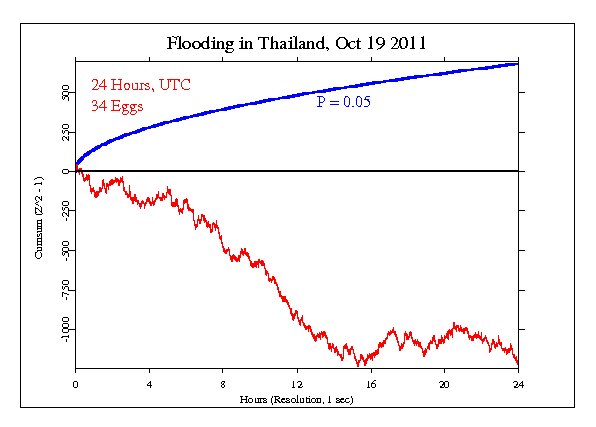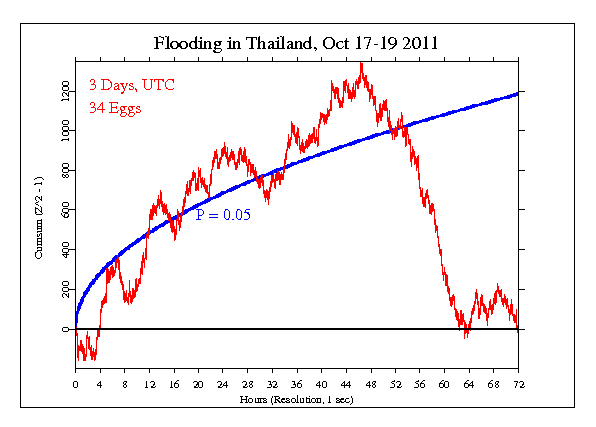|
Note: this event analysis is done with only 34 eggs. It will be redone later when the rest of the network is again reporting data after recovery from a server change.
While the public outcry against the government austerity measures in Greece gains voice
and grows in numbers and stridency, there is a major natural disaster unfolding in
Thailand. Here are some notes on the latter from Southgate Amateur Radio News:
The death toll from the most devastating flooding to hit Thailand in over 60 years following heavy rains since late July has now risen to almost 300.
Nearly three million people are said to have been affected by the floods, and the disaster has caused serious damage to the country`s agriculture and other industries, with Japan`s Toyota, Sony and Honda along with USA's Western Digital -- and many other factories to the north of Bangkok -- suspending production until the situation improves.
Damage so far has been assessed at more than 20 billon baht and 26 out of the country's 77 provinces are affected, while Bangkok is bracing for a large amount of run-off water that is about to reach the city and which will coincide with seasonal high tides that will make it harder for the flood waters to flow out to sea.
The situation in Greece threatens the Eurozone and with it the world economy, so it
garners attention. With the floods now endangering and partially
engulfing Bankok, the world media are giving Thailand more coverage, though they tend
to focus on the politically contentious.
My wife proposed that these very
different but deeply meaningful events
constitute a powerful presence in the global mind's eye. Both are slow-moving disasters which we can only sample. In Thailand, we can hope that the leaders bring sufficient wisdom and
material to bear to avert a greater tragedy. In Greece the demonstrations are
huge, and increasingly violent. We can only hope they do not turn deadly.
The conversation about these ongoing events was on the 19th, so that day was selected as
representative of the persistent turmoil. The result for the 24 hours (UTC) is Chisquare
85185.209 on 86400 df, for p = 0.998 and Z = -2.935. The graph shows a very steady cumulative
deviation in the negative direction for most of the day,
which, although it is opposite to the GCP standard prediction, is so strong it looks meaningful.

The continuing turmoil in Greece and the slowly unfolding disaster in Thailand
illustrate "events" that our technology cannot adequately address. Not only are they
persistent over time, they literally overlap so there is no obvious way to attribute
correlations to one or the other situation. Only when we can specify a few hours that "should"
represent an event, are the resulting statistics interpretable.
To visually represent the difficulty, the graph below provides context for the
Thailand/Greece event. It shows
October 17-19, and the result suggests that While the final statistic
indicates no strong effect,
the history of deviations over the three days is remarkable. There are two
powerful trends (long periods of consistent deviation) one positive and one negative, that
cancel to produce a final statistic that is close to zero deviation.

It is important to keep in mind that we have only a tiny
statistical effect, so that it is always hard to distinguish
signal from noise. This means that every "success" might be
largely driven by chance, and every "null" might include a real
signal overwhelmed by noise. In the long run, a real effect can
be identified only by patiently accumulating replications of
similar analyses.
|